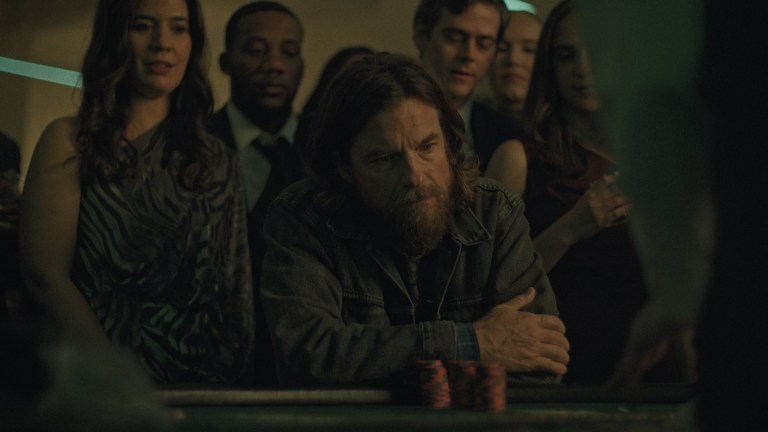Netflix’s Black Rabbit Is More Stressful Than Uncut Gems
The Jason Bateman and Jude Law-starring series is an examination of addiction and co-dependency that will leave your stomach in knots.

This article contains major spoilers for Black Rabbit.
Behavioral addictions are curious and fascinating. We often know why people can’t stop using a substance — bodies and minds become dependent on certain chemicals — but watching someone engage in the same behavior, over and over again, continuing to accrue emotional, physical, and spiritual debt, can be maddening. In addition to sharing the DNA of a gritty, New York underground setting, the new Netflix series Black Rabbit and the Safdie Brothers’ film Uncut Gems are cut from the same stress-inducing cloth as they follow individuals with behavioral addictions (gambling and codependency) that begin to rapidly unravel the fabric of their lives.
In Black Rabbit, Jude Law and Jason Bateman play brothers with a shared traumatic past and a codependency that won’t quit. Bateman is Vince Friedken, a down-on-his-luck dirtbag with a fierce gambling addiction who flits from place to place, scraping by on his wits and his charm. Law is Jake Friedken, Vince’s charismatic and ambitious younger brother who stayed in their home town of Brooklyn to make good as the owner and manager of a chic hot spot restaurant called the Black Rabbit. (Hey, that’s the name of this show!)
Black Rabbit also happens to be the name of the band that Vince and Jake started when they were young adults. As the narrative unfolds, we see that Jake has always been eager to follow Vince’s whims and, more often than not, his dependence on his ne’er-do-well brother gets him into serious trouble. As Vince returns to town and faces a six-figure gambling debt held by a terrifying gangster (Troy Kotsur, in an affecting performance), Jake gets pulled into the drama. And, as we follow the trials and tribulations of these two men as they navigate the lawless backrooms of Brooklyn, digging themselves in ever deeper, it’s impossible not to draw comparisons to Uncut Gems.
In the film, written and directed by the Safdie Brothers, Howard Ratner (Adam Sandler) is a wealthy jewelry store owner with a mountain of gambling debt. At every turn, Howard makes decisions based purely on addictive instincts instead of rational thought. It’s vexing to watch him as he doubles down on risky bets, evades gangsters who are trying to collect on his debts, and often delights in the adrenaline rush that living on the edge gives him. The experience of watching Uncut Gems is so anxiety-provoking that a critic from The Guardian stated, “…it is so stressful it should come with a panic attack warning.” And, watching Black Rabbit, as Vince and Jake continually make wrong-headed choices in the name of survival, manages to evoke even more stress as the runtime of the series is nearly quadruple that of Uncut Gems.
While the series puts Vince’s dangerous gambling habits front and center, it also takes pointed aim at codependent relationships as harbingers of pain. As Vince and Jake begin to slide back into debauchery, we get a scene where two of their employees, Roxy and Tony, chat about their bosses’ bond. When Roxy calls out a shady fundraiser that Jake is holding at the restaurant, Tony says, “Yo, just have some sympathy, Vince is an addict.” When Roxy protests, saying she’s talking about Jake, not Vince, Tony responds right back. “Well, he’s an addict too,” he says. “What the fuck’s he addicted to?” snipes Roxy. Tony sagely responds, “His brother.”
Even though it’s heartbreaking to watch Vince try to scramble his way out of his debt by going for broke in a backroom, high-limit casino, much like watching Howard Ratner frantically place bets in a manic frenzy that seemed out of his control, it’s almost more heartbreaking to watch Jake defend and chase Vince’s bad behaviors at every turn. The high he’s chasing doesn’t have a tangible component; he’s simply seeking a connection with his older brother. As the narrative unfolds, we learn that (spoiler alert) Vince murdered their abusive father as a teen. He accomplished this by dropping a bowling ball on the man’s head to stop him from brutally beating their mother. Vince was the perpetual protector, carrying this secret alone for decades. It’s no wonder that he sought to mute his pain with gambling, alcohol, and drugs. Vince is aware of how his continued addictive behaviors impact his brother and the rest of his family, which is why he’s constantly trying to skip town and make a life elsewhere, but ultimately is drawn back to those who love and accept him.
While Vince’s debt looms over the two brothers, Jake is also struggling to bring his vision for a second restaurant to fruition and chasing a relationship with his best friend’s girlfriend. (Big oof, buddy.) Jake’s setting of professional goals from when he and Vince originally opened the Rabbit together, along with his choice of an unavailable individual for a deep relationship, align with his patterns of behavior from childhood. In this way, Black Rabbit can also be looked at as another recent stress-inducing narrative, FX’s The Bear. Much like in Black Rabbit, Carmy Berzatto lived his life in pursuit of pleasing Mikey, his older brother who attempted to protect him from the craziness of his family, but who also struggled with addiction and depression. The storyline isn’t exactly the same, but the broad strokes are similar to anyone who has even a passing knowledge of intergenerational trauma. Families of origin can be quite the bitch, am I right?
Carmy’s brother never gave him a chance to work with him, instead telling him that he could never work for him at their family restaurant and then dying by suicide before passing the torch. Without getting into spoiler territory for The Bear, the emotional scars that Mikey’s death left on Carmy (and the rest of the family) drive a lot of the narrative on the series, resulting in tense relationships, unchecked patterns of maladaptive behaviors, and a whole lot of anxiety. But while The Bear makes a pointed attempt to focus on the love and laughter that the characters share in the kitchen, Black Rabbit’s service aisle is coated in a thin layer of greasy gloom, answering the age-old question: What if The Bear was actually a drama? Well, it would be Black Rabbit.
The layers of stress that permeate Black Rabbit, The Bear, and Uncut Gems all stem from watching people make mistakes that seem as if they could be easily avoided. So, when Vince bets his entire bankroll on a single hand of blackjack, or when Jake nervously covers up the rape of one of his employees, or when the two brothers offer up the opportunity to rob the Rabbit as restitution for Vince’s debt, or when Vince agrees to participate in that robbery, only to kill a mobster and go on the run, we cringe in the knowledge that these decisions were made from a place of panic. Perhaps it’s interesting to watch fictional characters make these mistakes so we can forgive ourselves for our own misgivings, or maybe it’s electrifying to think that humanity is capable of such range.
As Black Rabbit works up to its explosive finale, we get a chance to focus on the two brothers at their most connected and emotionally open. The electric interpersonal chemistry between Jude Law and Jason Bateman is put to excellent use here, as the two riff off one another like true brothers might. Here, all the erroneous plot threads fall away, and the story becomes a dance between the siblings as they contemplate if survival can exist separately from their status quo of mutually assured destruction. As Jake scrambles to secure Vince a safe way out of the country after the robbery and murder at the Rabbit is pinned solely on him, Vince begins to consider another way out.
In preparation for his final act, Vince begins to confess to his father’s murder. But Jake already knows. And he loves Vince in spite of it, perhaps even because of it. He’s convinced that his brother is a good person, and he has set his mind to do whatever it takes to protect him, as he protected Jake all those years ago. “You are not a bad person, and I’m not fuckin’ leaving you,” he says as he presses his forehead against his brother’s face. Tragically, Vince understands this to mean that Jake can only thrive if he is gone. He steps onto the ledge of the roof and tells his younger bro to let go. Feeling as if this is the only way to free Jake, he tips backward, falling to his death, and leaves Jake standing there, frozen in a statue of disbelief and anguish.
The coda of Black Rabbit sees everyone moving on with their lives in a montage set to Dinah Washington’s rendition of “Manhattan.” As Washington croons that Manhattan will “turn into an isle of joy,” everyone settles back into their lives after the chaos that the Friedken brothers wrought. Unlike the finale of Uncut Gems (which I will not spoil here), Black Rabbit allows for a beat to regroup after the unrelenting barrage of anxiety-inducing scenes that have led to this conclusion. For a show that’s so steeped in despairing moments, it almost feels odd that it would leave us with a happy one.
All eight episodes of Black Rabbit are available to stream on Netflix now.
